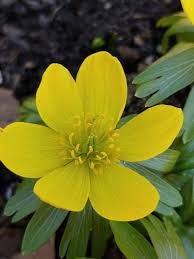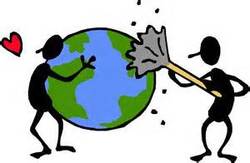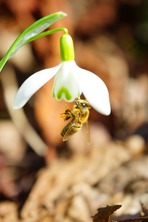 If you are struggling with the long grey winter days, then now is the perfect time to order some bulbs and tubers guaranteed to brighten your winter garden next year. An added bonus is that they will also provide nectar for winter foraging insects and bees emerging early from hibernation. Snowdrops (Galanthus nivalis) can be bought as dry bulbs but establish much more effectively if bought "in the green". This simply means that they are actively growing and you will get clumps of bulbs in leaf. Now is the perfect time to order them and although you wont get any flowers this year they should quickly establish and reward you with flowers next January and February. Galanthus nivalis is the common snowdrop and the one you are most likely to see in the wild. It likes partial shade and will tolerate most soils, if happy gradually spreading to form large clumps. They will naturalise in grass and are ideal for adding winter colour under trees and deciduous shrubs. Make sure to plant some where you can see them from your windows or front door, then you can enjoy then whatever the weather.
0 Comments
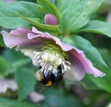 Today is Earth Day when across the world organisations and individuals come together to celebrate and "promote a healthy environment and a peaceful, just, sustainable world". The Washington Institute has published a score card highlighting four key areas of concern for 2015, so what can we do at home to help? 1. Make our outside spaces wildlife friendly One in four species of birds, mammals, reptiles, amphibians and fish are on the verge of extinction or extinct. We can do our bit for our local species by making our gardens or outside space more welcoming for wildlife. The RSPB campaign Make a Home offers lots of excellent tips for making your space wildlife friendly. Even the smallest balcony can offer food and shelter for birds and insects. Wildlife friendly does not have to be untidy, a formal pond will attract wildlife and many flowers adored by the most discerning gardener are equally loved by bees and other insects. 2. Use your harvest One person in six alive today is chronically hungry. I am not sure that the keenest grow-your-own enthusiast can solve this one but there are things we can do to help reduce food waste and local charities. Maybe you have fruit trees but are unable to pick the fruit or it's simply too much for you to use. Locally Northfield Ecocentre run Urban Harvest which collects unwanted fruit and vegetables and redistribute them to local charities, schools and a local Community Café, the rest is used to create lovely juices and preserves. Thousands of tonnes of fruit goes unused in our city gardens so why not help reduce the waste. Or if you haven't got any surplus why not help by volunteering with the harvest. 3. Buy local and recycle Between between 1970 and today 160 billion tonnes of carbon dioxide have been released into the atmosphere, that's more than in the previous 200 years. We can all help by buying plants and sourcing our hard-landscaping materials locally. There are many small plant nurseries which offer a larger and more interesting range of locally grown plants than you will find in the big Garden Centres. When re-designing a planting scheme or garden I always try and re-use or recycle what I can. If it isn't wanted or doesn't fit with the new scheme then there is nearly always someone who can use it, try advertising on your local Freecycle or Streetlife. 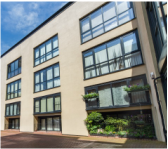 4. Celebrate our green spaces The final scorecard fact is that the Earth's population has almost doubled since 1970, and in the same period the share of cropland per person has almost halved. I had to think laterally on this one as I am not sure that I can help with either of these : ) But the message I think we should take is how lucky we are to have public and private green spaces to enjoy. We should celebrate this and ensure that we are making the most of whatever outside space we have - every little bit of green we can create in our cities helps reduce pollution, support wildlife and provides enjoyment not only to us but everyone one who passes by - guess which is my outside space? If you would like to celebrate Earth Day but like me are at work today, then why not go along to the free Birmingham Botanical Gardens Earth Day at the Gardens on Saturday 25th April. This year it also commemorates the 70th Anniversary of the end of World War II highlighting the role of Victory Gardens from their design, propaganda and the impact on gardening today.
|
Archives
May 2021
|
